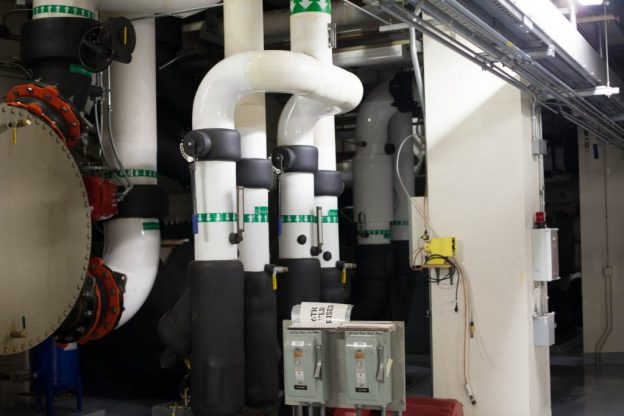COMMERCIAL HVAC REPAIR OR REPLACE?

What to do When Your HVAC System Acts Up
When the season changes, facility managers often wonder if their building’s HVAC system is ready to take on the weather ahead. When commercial HVAC equipment shows signs of not working properly (lessened airflow, difficulty keeping proper temperature, increasing energy bills, etc), the debate of whether to repair or replace begins. Commercial HVAC equipment is an investment. You want to get as much out of your system as possible, but you also need your system to keep your facility comfortable.
Know Your HVAC System History
It’s important to know about the history of your HVAC equipment. Keep files on your equipment that tracks and records the below information:
- Original HVAC installation date
- Previous repairs completed
- Manufacturer’s model and serial number
- Operating and installation instructions
- Warranty information or factory-backed service and maintenance agreements
This information can prove helpful when deciding whether or not to repair or replace your equipment. If you hire an HVAC service company, they will want to see these records.
Repair or Replace?
There are many factors that contribute to whether you should repair or replace your commercial HVAC equipment. As noted above, age of equipment, repair history, and warranties may have an impact on the best course of action.
- HVAC installation date: If your HVAC equipment is at or reaching its life expectancy (anywhere from 12-20 years depending on the equipment), it may make more sense to replace your equipment. *If your commercial air conditioning system is from 2010 or earlier, it may use R-22 refrigerant which is being phased out of use due to ozone depletion. Now would be a good time to replace your air conditioning system!
- HVAC repair history: If your equipment has had more than three repairs in recent years, it may indicate that your equipment is deteriorating or has issues that can’t be repaired.
- Equipment warranty: If your equipment is no longer covered by warranty, you will be responsible for any repair costs.
- Energy-efficiency: If your equipment is 10+ years old, you may find it worthwhile to invest in a newer, more energy-efficient HVAC system.
Partner with an Expert HVAC Company
While knowing the history is really helpful, the best way to know whether to repair or replace your HVAC system is to partner with a commercial service company. A certified HVAC service professional can come out and inspect your equipment. The HVAC technician will give your system a thorough inspection to determine the best course of action. A detailed inspection will include:
- Checking filters coils for debris or damage
- Checking refrigerant levels
- Inspecting operating condition of all heating and cooling equipment
- Checking for leaks
- Monitor airflow
- Thermostat calibration
Once the HVAC inspection is complete, your service professional can make a recommendation to repair or replace any equipment that’s causing an issue. In some cases, a simple repair can significantly extend the life of your equipment. In others, the best solution for your facility is going to be an equipment replacement. While new equipment can cost more than a repair, it can also provide long-term utility savings if the new equipment is higher efficiency.
Whether you decide to repair or replace the equipment, the best thing you can do for your HVAC system is routine inspections and service. Regular professional HVAC tune-ups are the best way to ensure you get the most out of your equipment investment!
